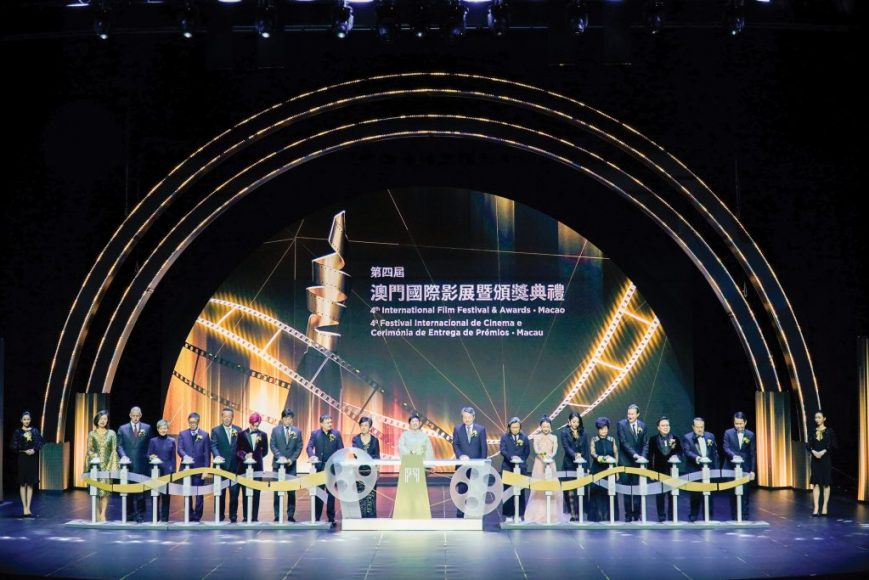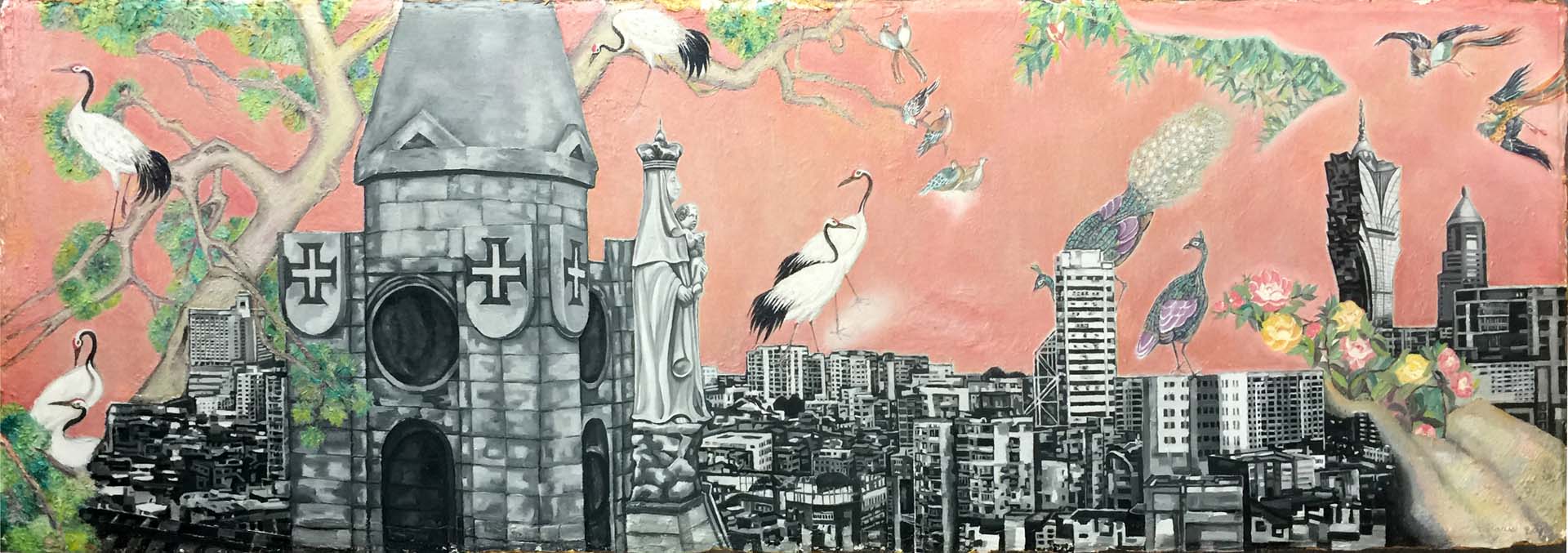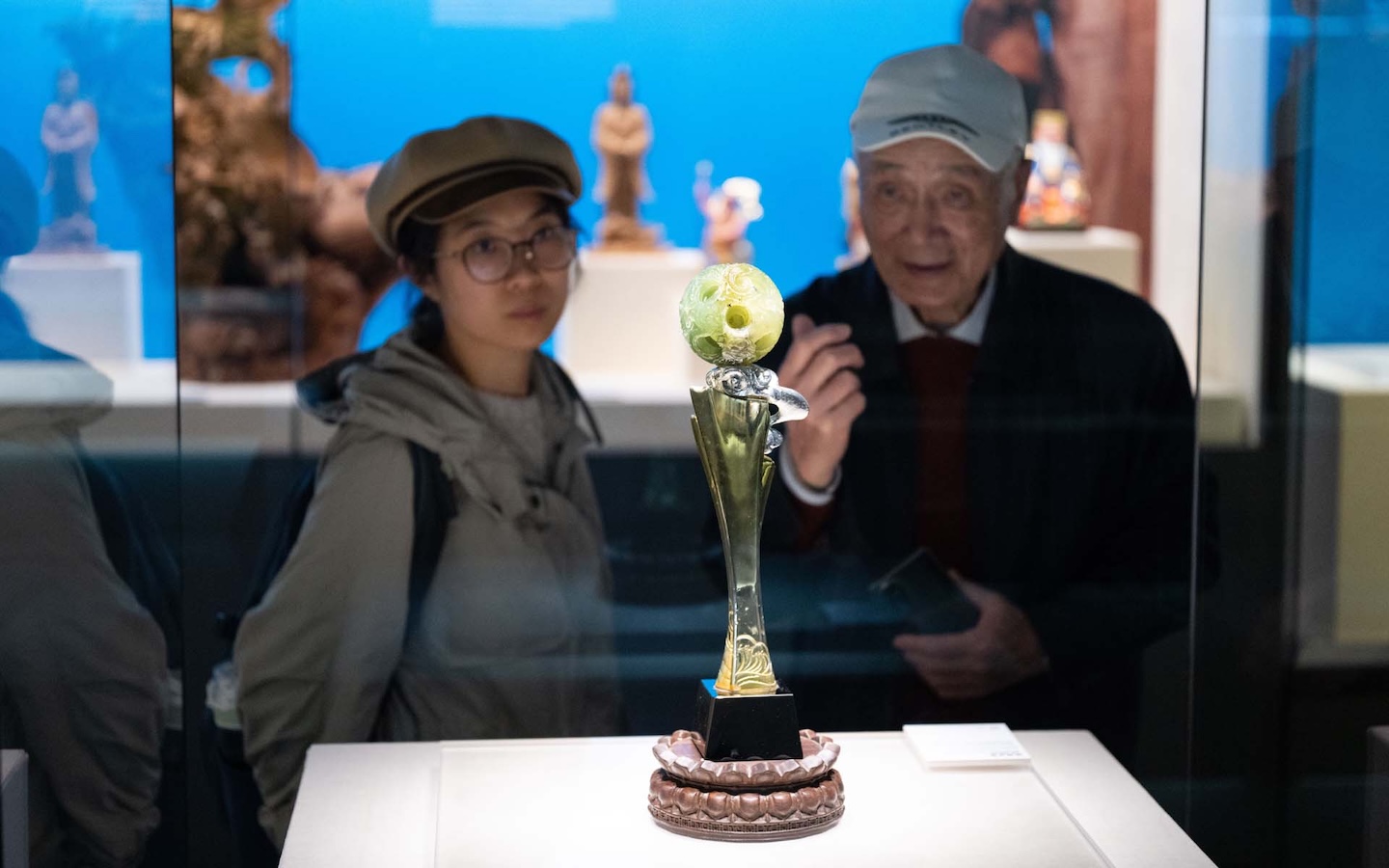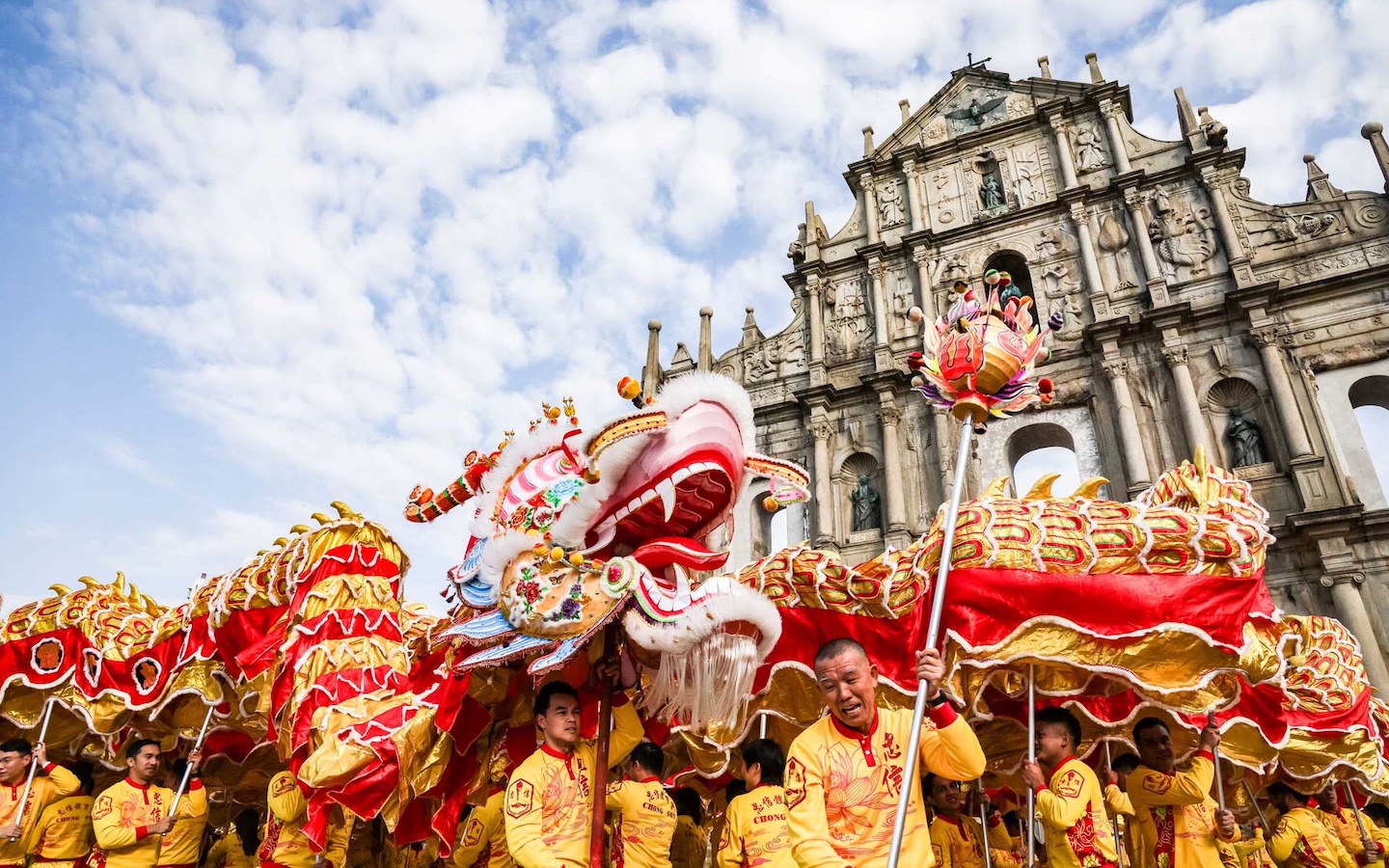TEXT Cláudia Aranda
Hundreds of filmstars, movie makers and fans of cinema graced the glittering fourth edition of the International Film Festival and Awards Macao last month.
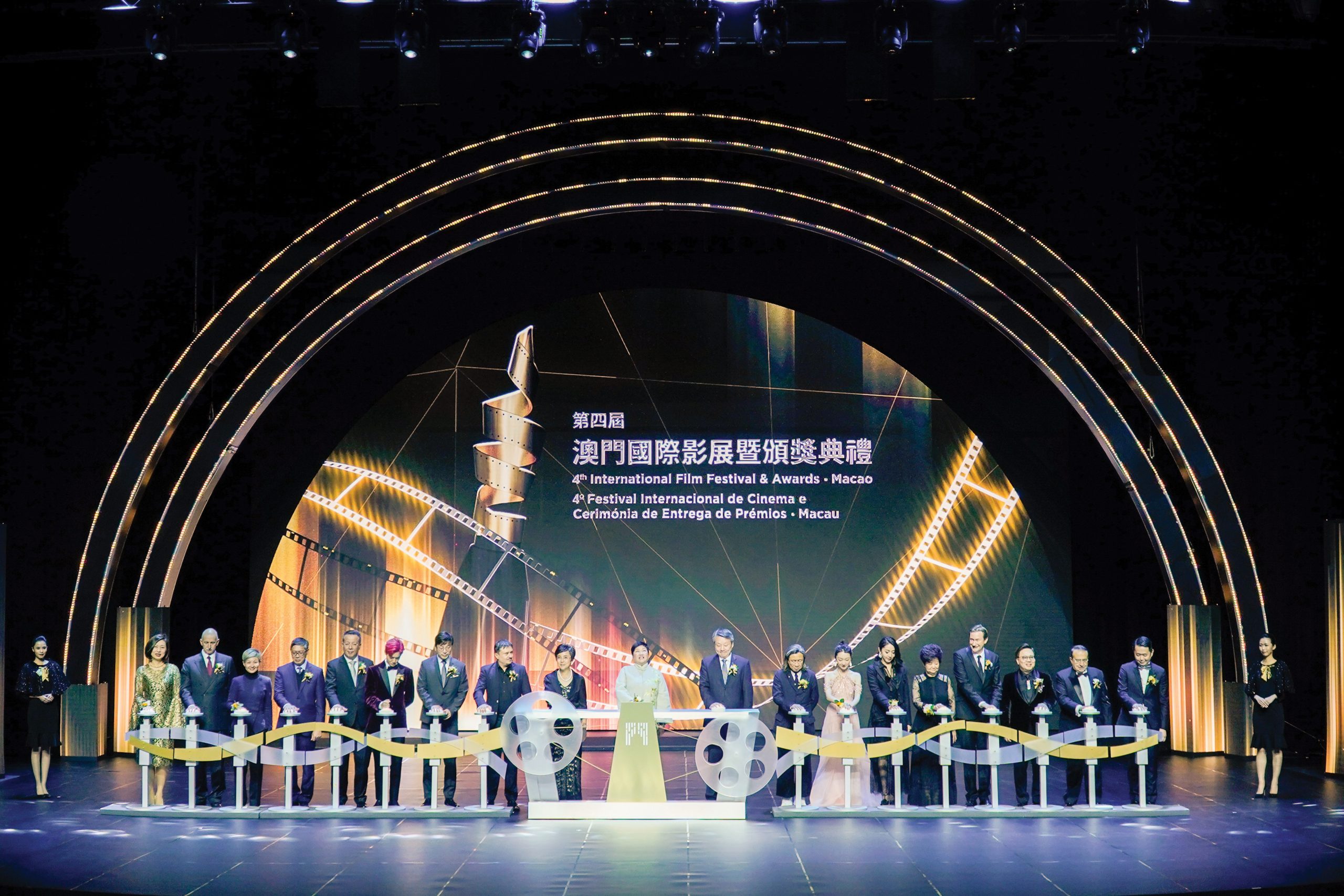

The red carpet was rolled out for some of the most recognisable names in Asian cinema during the fourth edition of the International Film Festival and Awards Macao last month. More than 800 guests graced the SAR’s biggest movie celebration of the year, with many cinematic talents posing for the cameras at the opening and closing ceremonies.
Aimed at building a platform for cultural exchange across the East and the West, the festival, which has been running annually since 2016, showcased the best of Asian and international cinema between 5 and 10 December. Around 50 films and six shorts were screened over the six days and a plethora of major awards were given out to movie makers, cast and crew from Macao, Asia and across the world at the annual Awards Ceremony on 10 December.
The festival, which was jointly organised by the Macao Government Tourism Office and the Macau Films and Television Productions and Culture Association, is committed to becoming a major gathering for international filmmakers to enhance cultural exchange, while putting Asian film talent and works on the global stage.
One of the highlights of the festival was Juliette Binoche’s encounter with award–winning Chinese director Diao Yinan during an open session. The French actress, who said she had been ‘touched by the tradition, the way of thinking and the poetry in China’, shared details of her new film ‘The Truth’, directed by Japanese creative Hirokazu Kore–eda, with the audience. She also shared her experience on working with different filmmakers, including Iranian talent Abbas Kiarostami and Polish director Krzysztof Kieslowski. Yinan and Binoche interacted enthusiastically as the French actress expressed her availability to star in one of Yinan’s films. Binoche was the talent ambassador along with Hong Kong star Carina Lau and K–pop performer and actor Kim Junmyeon – aka Suho.
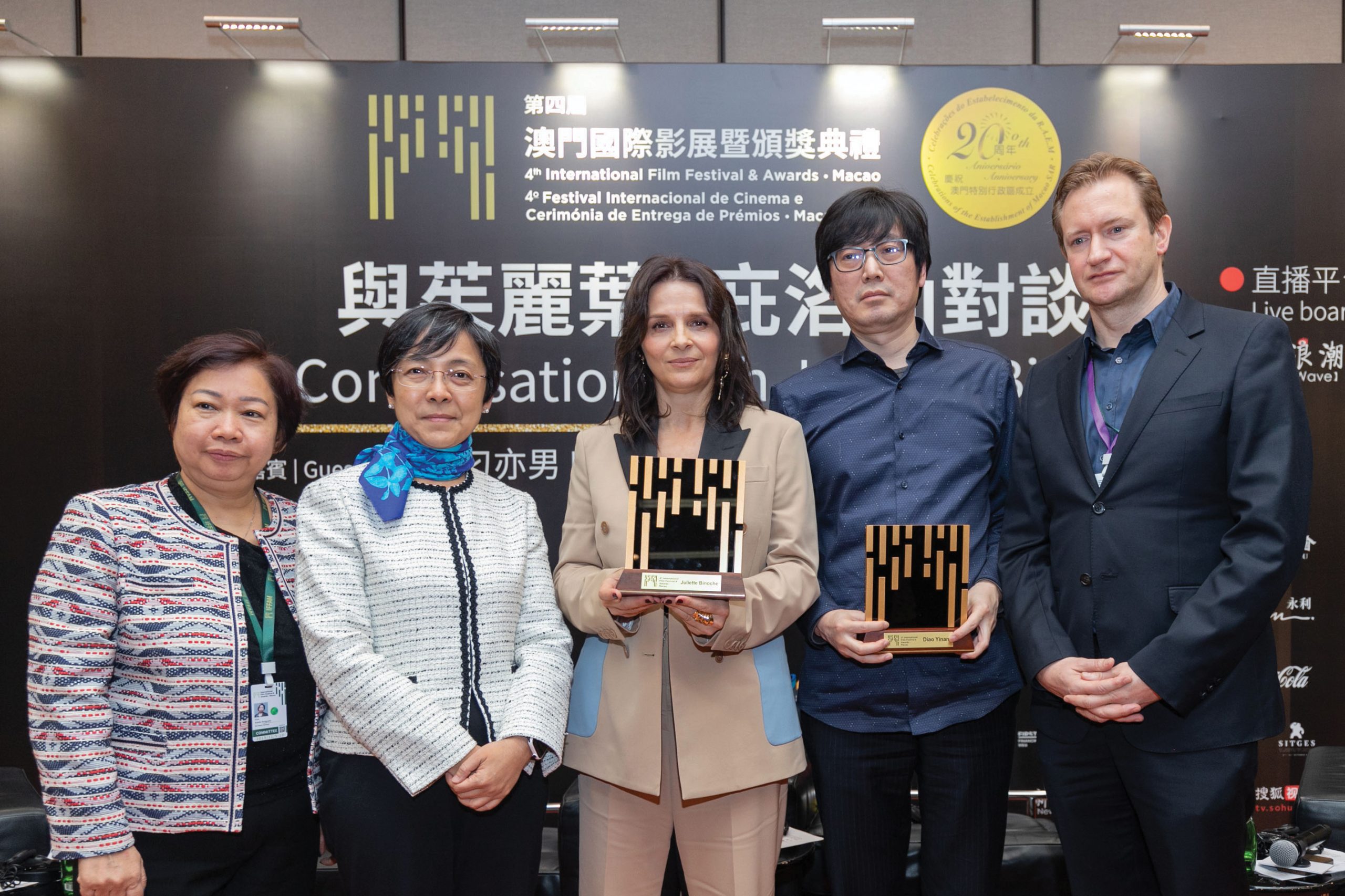

The festival included two main competitions: an international event where 10 feature films from first or second–time filmmakers competed for five awards including a US$60,000 (MOP 481,350) prize for Best Film. And there was also an expanded New Chinese Cinema section, which this year added a competition element, with directors vying for five accolades. All of the winners were revealed at the awards ceremony.
Director of the MGTO and president of the IFFAM’s organising committee, Maria Helena de Senna Fernandes, remarked that with the experience the organisers had gained from the past three editions, they were able to ‘progressively shape IFFAM into a mega event established with its own orientation, unique characteristics and special elements of Macao’. She added: “Macao could deliver a positive impact as a melting pot in the cultivation of Asia’s next generation of film directors and film talent.”
Taika bow
The festival opened on 5 December with a screening of ‘Jojo Rabbit’ by Taika Waititi, winner of the People’s Choice Award at the Toronto International Film Festival and considered by critics as a potential Oscar nominee. Two of the films screened in the past two editions of the festival have garnered Oscars for Best Picture – ‘The Shape of Water’ in 2018 and ‘Green Book’ last year.
With Portuguese being one of Macao’s official languages, the festival always includes the screening of Portuguese–speaking films. During the five days, it showcased the Portuguese film ‘The Domain’ by Tiago Guedes and Karim Aïnouz’s Brazil–Germany co-production ‘The Invisible Life of Eurídice Gusmão’.
The IFFAM International Competition featured 10 films from across the globe, with ‘Give Me Liberty’ scooping the Best Film award. Written and directed by Kirill Mikhanovsky, a Russian who emigrated to the US, and produced and co–written by Alice Austen, the film draws inspiration from the director’s experience as a medical transport driver for people with disabilities. Mikhanovsky said the movie is a drama where ‘characters are able to laugh at themselves and we laugh with them’ because ‘we always find humour in the most difficult moments’. He said: “Comedy is the noblest sub–genre. The comedy of life and we are all part of it. It’s great to be here to celebrate the comedy of life because that’s the only way to confront reality, through humour, by laughing at ourselves and at life.”
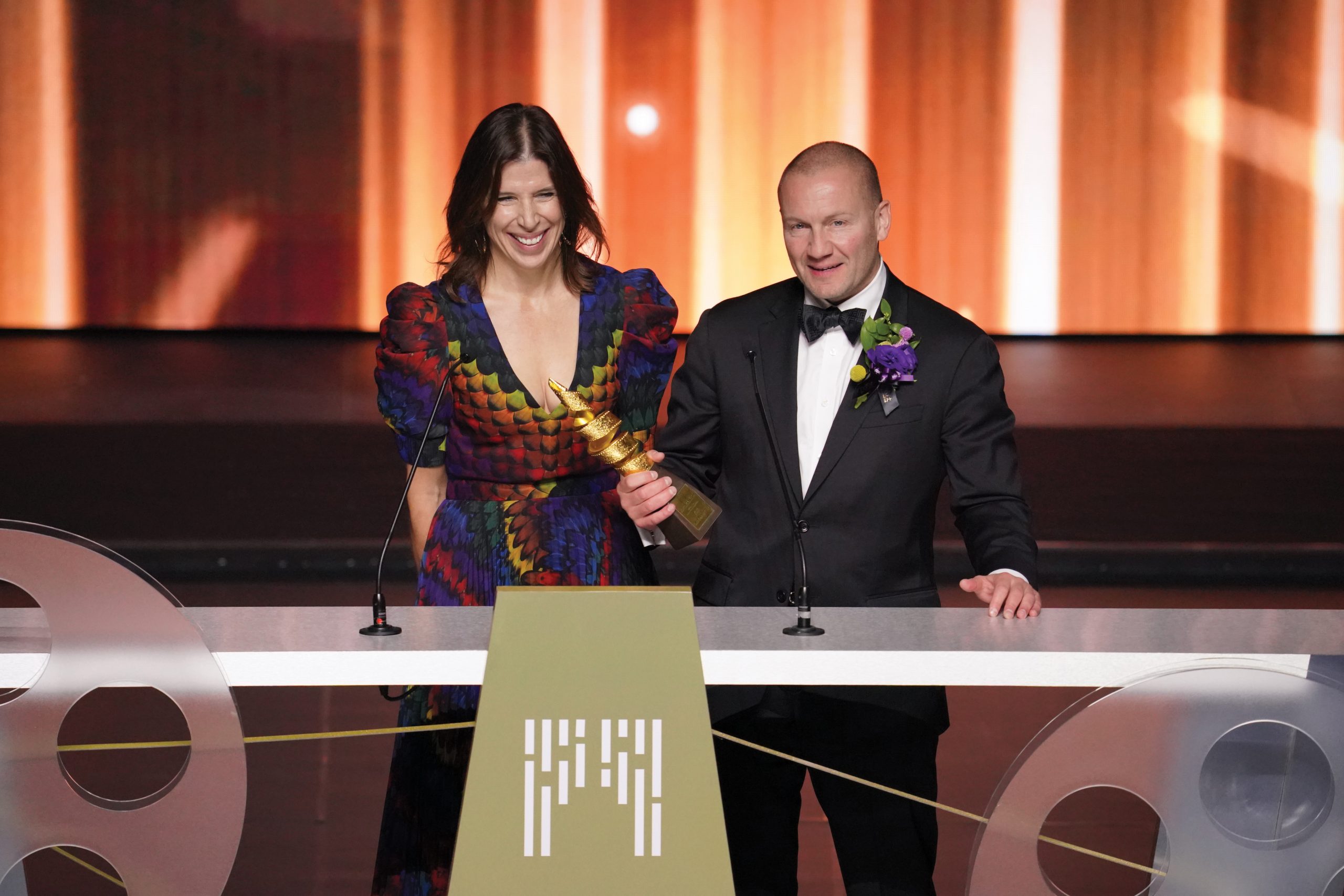
President of the International Competition’s jury, Hong Kong director Peter Chan Ho–sun, said that ‘most of the directors are first-time or second-time directors’ and he said he had seen ‘that they have used some new ways to make movies, which is very inspiring for me’. Chan also shared that the jury members – which included British actor Tom Cullen of TV series ‘Downton Abbey’ and Indonesian actress Dian Sastrowardoyo – were compatible. “We did not argue a lot,” he said. “We share similar ideas and similar feelings, and we voted for the same movie. We made decisions in a very short period of time, which is very rare.”
People’s award
Cambodian human trafficking drama ‘Buoyancy’ by Rodd Rathjen – which won a Prize of the Ecumenical Jury during the 2019 Berlin International Film Festival – received the Macao Audience Choice Award, while the film’s protagonist Sarm Heng picked up the Best Actor trophy. Other notable wins included the Best Director prize going to UK–based Fyzal Boulifa for his debut feature ‘Lynn + Lucy’, while the film’s lead performer, Roxanne Scrimshaw, picked up the award for the Best Actress. The Best Screenplay award went to Hamish Bennett from New Zealand with ‘Bellbird’.

The New Chinese Cinema competition pitted seven films from Chinese–speaking territories, an increase from last year’s six, showing a wide range of different voices from diverse regions across Asia but all sharing the same language. Debutant filmmaker Gu Xiaogang’s ‘Dwelling in the Fuchun Mountains’ won the Chinese language Best Film of the Year. Inspired by the painting of the same name by Huang Gongwang, the film follows the fates of a provincial family across four seasons.
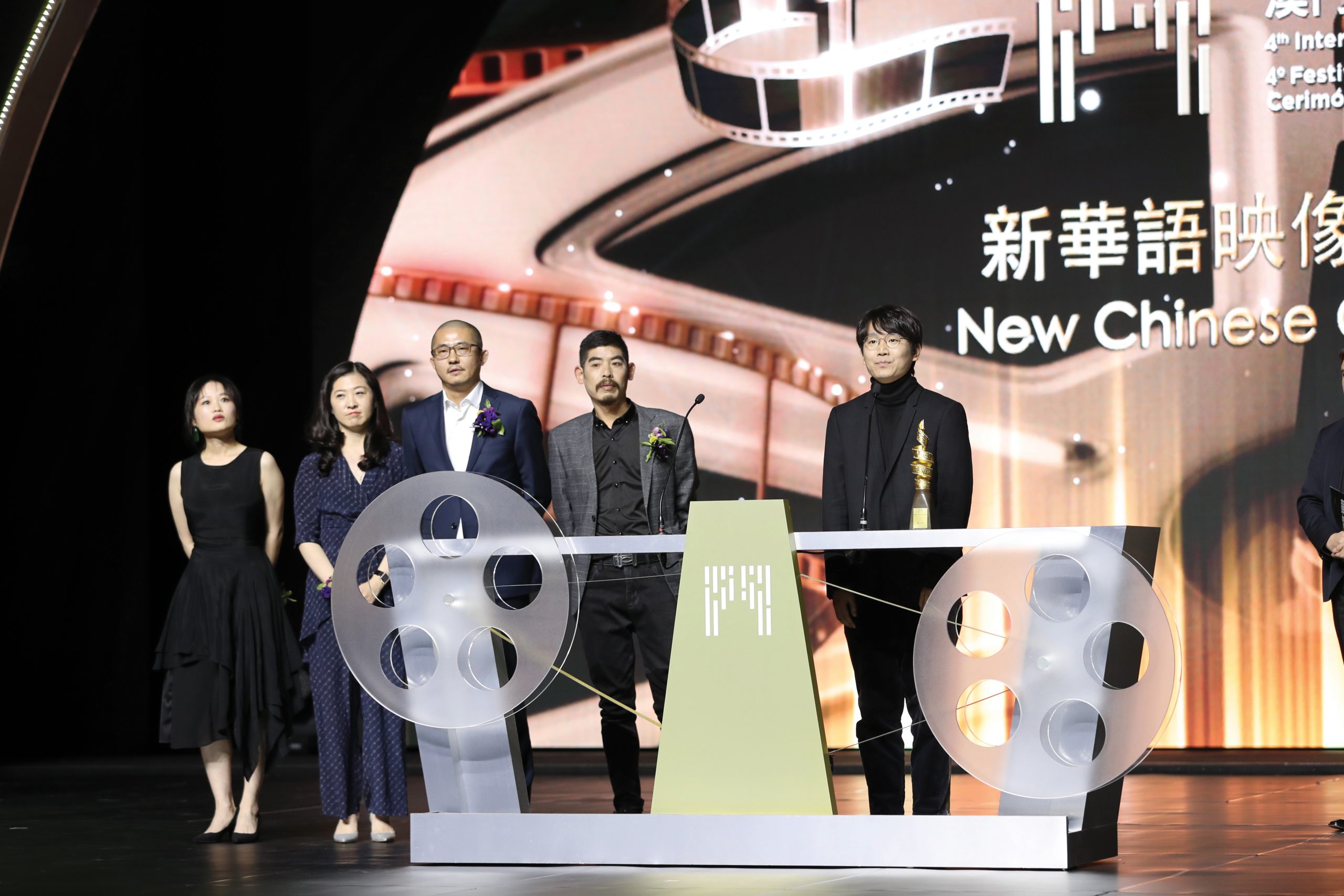
Romanian award–winning filmmaker Cristian Mungiu was the New Chinese Cinema jury president. He said that being part of a film festival jury is ‘not only about watching movies’ – the jury member must understand ‘the spirit of the place, the complexity of the local culture and the direction’ of the territory, as well as ‘the direction the cinema goes’ in. He added that the jury members spent time together ‘discovering a very beautiful place with very welcoming people and very fresh cinema’.
Chinese film director Li Shaohong was given the ‘Spirit of Cinema’ Achievement Award during the festival. Her ‘A City Called Macau’, which was released last year and serves as a tale of misplaced affection and gaming addiction in the SAR, was screened at the event. The filmmaker expressed surprise at the ceremony, saying that she was too young to earn such award. “I still want to shoot many films,” she said. “I feel I still have the energy and the desire to shoot more great films to offer to the audience.”
“Your films are like your children,” continued Li. “You think all your films are great and you have special feelings towards those films. Actually, ‘A City Called Macau’ is one of my favourites. It was shot in Macao but the story is connected with the Mainland. It actually reflects the economic transformation in China.”
Local plaudits
To celebrate the 20th anniversary of the establishment of the SAR, a quintet of local films were introduced at the festival. “I am especially pleased that there are five new Macao features in the programme in this special anniversary year,” said Mike Goodridge, festival artistic director, as he introduced them.
The quintet included ‘Years of Macao’, which was commissioned by local filmmaker Tracy Choi, who selected nine shorts by nine local directors to make up the movie. ‘Years of Macao’ picked up the Cinephilia Critics’ Award for Best Macau Film and the other films were ‘Ina and the Blue Tiger Sauna’ by António Caetano de Faria and Bernardo Rao; ‘Let’s Sing’ by Keo Lou; ‘Patio of Illusion’, a drama by Shangshi Chen that pays homage to the rich heritage of the city; and ‘Strings Of Sorrow’, a drama by Oliver Fa that introduces Macao’s classical music scene.
The Shorts Competition was a new highlight launched in this edition of the festival. The Best Short Film award was granted to a Hong Kong production, ‘Lonely Encounter’ by Jenny Wan, who is actually a young director from Macao. There were four entries for the Shorts Competition, including ‘Little Red Riding Hood’ from Macao.
Aspiring ‘to create an effective exchange platform for the film industry’, the IFFAM Industry Hub featured the IFFAM Project Market, Work–in–Progress Presentation and the Macao Forum. It took place for three days in a row, gathering more than 200 industry professionals from more than 30 countries and regions. The Project Market was ‘a point of pride’ according to its curator, Todd Brown, who presented 14 ‘particularly strong’ feature-film projects. Two of the projects were directed by Macao directors: ‘Investigator Mendonza’ by Maxim Bessmertny and ‘The Fortune Tower’ by Harriet Wong Teng Teng.
The Project Market Awards were announced on 8 December, with Dodo Dayao, the Filipino director of critically acclaimed ‘Violator’, winning the US$15,000 (MOP 120,400) Best Project Award for his ‘Dear Wormwood’. Portuguese director Leonor Teles won the US$5,000 (MOP 40,140) Macao Spirit Award with the project ‘Uk Kei’, a journey of self–discovery. Teles is the youngest director ever to have won a Golden Bear for best short after he scooped the prize at the Berlin International Film Festival in 2016.
The budget for the festival was similar to previous years, amounting to MOP 55 million (US$6.86 million), which was covered by the government, as well as private companies in Macao. Apart from the film screenings, the festival also offered master classes, namely with South Korean director Kim Yong–Hwa, founder of visual effects company Dexter Studios which has worked on films such as ‘The Taking of Tiger Mountain’, ‘The Monkey King’ and ‘Kung Fu Yoga’. The festival wrapped up on 10 December, however over its six days, filmmakers, actors, crew, producers and the public were able to enjoy, celebrate and reward Asian and international cinema, as well as the ever–growing Macao industry. Expect the fifth edition this year to be even bigger and better, with hopefully some important wins for Macao.
AND THE WINNER IS…
The victors at the awards

WINNERS OF THE INTERNATIONAL COMPETITION
- Best Film: ‘Give Me Liberty’ by Kirill Mikhanovsky (US)
- Best Director: Fyzal Boulifa for ‘Lynn + Lucy’ (UK/France)
- Best Actress: Roxanne Scrimshaw in ‘Lynn + Lucy’ (UK/France)
- Best Actor: Sarm Heng in ‘Buoyancy’ by Rodd Rathjen (Australia)
- Macao Audience Choice Award: ‘Buoyancy’ by Rodd Rathjen (Australia)
- Best Screenplay: Hamish Bennett with ‘Bellbird’ (New Zealand)
NEW CHINESE CINEMA WINNERS
- Best Film: ‘Dwelling in the Fuchun Mountains’ by Gu Xiaogang (China)
- Best Director: Anthony Chen for ‘Wet Season’ (Singapore)
- Best Actress: Zhou Dongyu in ‘Better Days’ (China)
- Best Actor: Wu Xiaoliang in ‘Wisdom Tooth’ (China)
- Best Screenplay: Johnny Ma with ‘To Live to Sing’ (China/France)
AWARDS FOR OUTSTANDING FILMS AND FILMMAKER ACHIEVEMENTS
- Asian Blockbuster Film 2019: Parasite (Korea) by Bong Joon Ho
- Network for the Promotion of Asian Cinema (NETPAC) Award: ‘To Live to Sing’ by Johnny Ma (China/France)
- ‘Spirit of Cinema’ Achievement Award: Li Shaohong, Chinese filmmaker who directed ‘A City Called Macau’
- ‘Variety’ Asian Stars: Up Next Award: Asmara Abigail (Indonesia), Bea Alonzo (Philippines), Bhumi Pednekar (India), Jennis Oprasert and Praewa Suthamphong (Thailand), Liên Binh Phát (Vietnam), Lim Yoona (Korea), Ryota Katayose (Japan)
- Cinephilia Critics’ Award: ‘Wet Season’ by Anthony Chen
- Cinephilia Critics’ Award for Best Macao Film: ‘Years of Macao’ by Tou Kim Hong, Penny Lam, Albert Chu, Emily Chan, Peeko Wong, Chao Koi Wang, Maxim Bessmertny, Ao Leong Weng Fong and António Caetano de Faria
- Shorts Competition Best Short Film: ‘Lonely Encounter’ by Jenny Wan (Hong Kong)
IFFAM PROJECT MARKET AWARD WINNERS
- Best Project Award: ‘Dear Wormwood’ by Dodo Dayao (Philippines)
- Creative Excellence Award: ‘The Day and Night of Brahma’ by Sheetal Magan (South Africa)
- Best Co-production Award: ‘Drum Wave’ by Natalie Erika James (Australia/Japan)
- Macao Spirit Award: ‘Uk Kei’ by Leonor Teles (Portugal)
